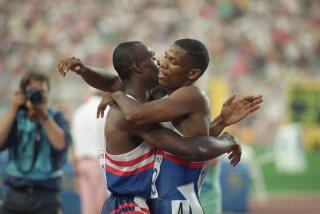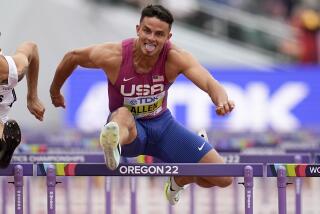It’s Been Quite a Run for One of These Twins
- Share via
SALINAS, Calif. — Alvin Harrison woke up in the back of his Ford Mustang one morning last year and realized his life wasn’t going anywhere.
Harrison’s family had never had much money, but as a young adult, trying to sleep over the uncomfortable hump in the back seat of his car was a breaking point.
Alvin realized he needed a plan, and he needed it quickly.
Running came to mind first. He and and his twin brother, Calvin, had been highly recruited track athletes during their senior year at North Salinas High in 1993, and family and friends often encouraged them to concentrate on refining their athletic talents.
Coaches frequently told the brothers they had the skills needed to win titles and, yes, even make it to the Olympics.
But when you’re living in your car and don’t have a dime in your pocket, making something of yourself on the track seemed an unrealistic goal.
“We’ve had to fend for ourselves for a long time, work odd jobs,” Alvin said. “Given that situation, track was the last thing on our mind.”
Which may explain why Alvin, 22, is considered one of the biggest surprises as a medal contender at the Summer Olympics in Atlanta. He was a virtual unknown when he made the U.S. team last month after finishing third in the 400 meters at the Olympic trials. His time of 44.09 seconds was the eighth-fastest in history.
Although he had run the 400 in only about a dozen meets before the trials, Alvin’s slowest time in four qualifying heats was 44.93. In the semifinals, he defeated eventual champion Michael Johnson by almost half a second.
But even more surprising to Alvin was finishing ahead of Calvin, who also qualified for the trials in the 400 but didn’t make it past the semifinals. Calvin holds the national high school record in the 400 and for years has been the self-proclaimed leader of the two.
But with a solid chance to win a medal in either the 400 or as a member of the country’s 1,600-meter relay team, Alvin said he can’t look back.
“My brother and I are about as close as two brothers can be, but when I’m out on the track I can’t be thinking about beating him out,” Alvin said last week from Lausanne, Switzerland, where he was competing in a meet. “My mind can’t be focused on Calvin or I’ll get left behind.”
That Alvin made it to the trials is a bit of mystery, considering he had almost no world-class or collegiate experience before resuming training last fall.
The bulk of his competition was in high school, where he and his brother began running track during their freshman year at North Salinas in 1990. Calvin, who almost always beat Alvin in races, was the first to become known when he qualified for the state meet in the 200 as a sophomore.
Although he didn’t place at the state meet, expectations had been set for the next two years. Those expectations were put on hold when the Harrison family moved to Orlando, Fla. Unhappy in their new environment, the brothers did not compete as juniors and concentrated on returning to California.
The twins, the middle of six children, were used to putting their goals on hold. Their father, Albert, is a construction worker who goes where there’s work; their mother, Juanita, tends to the children.
Alvin and Calvin figured returning to Salinas for their final year of high school would ease the financial burden on their parents, while allowing them to run for a track team they felt comfortable with.
They learned living on their own wasn’t easy. They moved several times, staying with different friends. Without parental guidance, they struggled with their studies.
But on the track, they flourished. Calvin won state titles in the 200 and 400 and was selected the national high school male track athlete of the year. Alvin performed well on two relays and barely missed the state finals in the 100 and 200.
“They have million-dollar smiles, and they know how to win people over,” North Salinas Coach Ed Barber said.
Barber spent hours making sure the twins went to class, had a place to sleep and stayed out of trouble. It wasn’t enough. They were recruited by many colleges, but the Harrisons lacked enough credits to graduate and didn’t have qualifying scores on college entrance exams.
With no diplomas and limited options, Alvin and Calvin enrolled at nearby Hartnell Junior College. They passed their entrance exams, qualified for financial aid and joined the track team.
Their college careers were short-lived. Alvin lost his eligibility midway through the outdoor season because of poor grades, and Calvin was kicked off the team for missing practices.
“I had a whole team to think about, and it wasn’t fair to keep giving them the benefit of the doubt,” Hartnell Coach Gary Shaw said. “Despite their Olympic potential, you have to be willing to play by the rules. I don’t think they quite understood that.”
After leaving Hartnell, the brothers finally parted ways. Calvin stayed in Salinas, working various jobs, and Alvin returned to Orlando and took a job on a computer assembly line. Neither did any running.
“A lot of other athletes out there had more money and support than Calvin and I had,” Alvin said. “It’s tough when you’re trying to go it alone.”
By early 1995, Alvin returned to Salinas. He couldn’t find steady work, and he often had to sleep in his car when he couldn’t afford to pay rent. That’s when he contacted Shaw about giving his track career another shot.
Shaw, believing everyone deserves a second chance, told Alvin he could train with the Hartnell team if he was serious about his intentions. Alvin started last October and never missed a workout.
His regimen included building up his endurance by running longer distances and spending more time in the weight room. By the spring, he had gained 20 pounds and shaved more than a second off his top sprint times.
Although he concentrated on the sprints in high school, Alvin began feeling more comfortable with the middle distances. There was talk about trying the 400 intermediate hurdles before he eventually settled on the 400.
The decision paid off early in the outdoor season when he ran a 45.24 at the Fresno Relays, a time that qualified him for the trials.
By now Alvin was even ready to take on Calvin, who had also resumed his training with Barber, his former high school coach. At the Mt. San Antonio College Relays in April, the twins went head to head in the 400 and Alvin ran a 45.21 to Calvin’s 45.26.
“Calvin had always felt he was the better performer,” Barber said, “but meet by meet I think he began believing more and more in his brother.”
Alvin’s comeback had its problems, however. He had to shuffle temporary jobs around a busy training schedule. Money was still tight. And he had several injuries, including a right hip problem that Shaw was certain would jeopardize his shot at making the Olympic team.
Mike Ward, Alvin’s training partner, never had any doubts. The two had run together almost every day for seven months, and Ward could see the determination.
“Alvin told me he had to do well because his future depended on it,” said Ward, a freshman. “He didn’t graduate from high school or college, and I think he felt track was his best chance of making something of himself.”
At the trials, Alvin hit his peak, running the four best races of his life, including his third-place finish in the finals behind Michael Johnson and Butch Reynolds.
After the trials, Alvin returned to Salinas for a day before leaving to compete in Europe. Last Friday, at a Grand Prix meet in Salamanca, Spain, Alvin won the 400 in 45.16; Calvin was second in 45.81.
“Everything is happening so fast that I can’t even catch my breath and take it all in,” Alvin said. “I’m not surprised by it all because I’m a very spiritual person and never lost my faith, but it’s sort of like a dream that I’ve waited 22 years for.”
More to Read
Go beyond the scoreboard
Get the latest on L.A.'s teams in the daily Sports Report newsletter.
You may occasionally receive promotional content from the Los Angeles Times.






